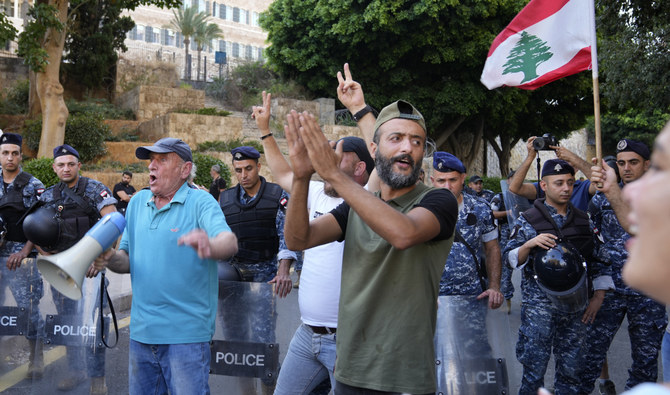BEIRUT: Lebanese children are at risk as water supply systems across the country teeter on the brink of failure, UNICEF has warned.
“While a total collapse of public water supply networks has so far been averted, the (water supply) systems remain on the brink, which poses a threat for the health of millions of people, especially children,” UNICEF said in a statement.
The UN body said Lebanon’s limited power supplies make it impossible to pump enough water, and in some cases, “cause pumping operations to shut down entirely.”
It added that it had previously warned “a year ago that the water system has reached a breaking point.”
Edouard Beigbeder, UNICEF’s representative in Lebanon, said that “millions of people in Lebanon are affected by the limited availability of clean and safe water, and addressing the issue is of (the) utmost importance for the health of children and families in Lebanon.
“Since the beginning of the crisis, per-capita water supplies from the water establishments have decreased dramatically amid frequent blackouts, falling short of the 35 liters a day considered to be the minimum acceptable quantity,” he said.
“The average cost of 1,000 liters of trucked water increased to 145,000 Lebanese pounds ($6 at the Sayrafa exchange rate) in April 2022, an increase of almost 50 percent compared with the same month in 2021.
“A family of five, drinking a total of 10 liters a day, would need to spend about 6.5 million pounds a year, in addition to the cost of water they use to meet their cooking and hygiene needs.”
Based on its report, UNICEF — which contributes financially to the operation of water pumps in Lebanon — “needs $75 million a year to keep critical systems operational and the water flowing to over four million people across the country and safeguard access and operation of the public water systems.”
The UNICEF warning came amid political chaos in Lebanon that is causing further crises, leading to caretaker Prime Minister Najib Mikati calling the country “Al-Asfouriyeh” (the lunatic asylum) in a speech on Wednesday.
Employees of the Banque du Liban continued with their three-day strike on Thursday, in protest against Mount Lebanon’s state prosecutor, Judge Ghada Aoun, raiding the bank’s headquarters on Tuesday, in search of its governor in order to arrest him.
The raid took place after Riad Salameh failed to show up for questioning on charges of illicit enrichment and money laundering Aoun charged him with in March.
For the second consecutive day, exchange operations at the bank’s Sayrafa rate platform were put on hold, prompting traders and citizens alike to turn to the black market for dollars.
Other operations affected include check clearing, transfers abroad, opening credits and other procedures. More importantly, payment orders and transfers issued by the Ministry of Finance will not be disbursed.
Repercussions triggered by the arrest of Bishop Musa Al-Hajj, archbishop of Haifa and the holy land, also continued after he was detained on Monday at the Lebanese border post in Ras Al-Naqoura after returning from Israel. He faced an 11-hour interrogation, with money and medicines he brought from Lebanese who fled to Israel 22 years ago being seized.
The Council of Maronite Bishops, which held an exceptional meeting on Wednesday, expressed its dismay at Al-Hajj’s arrest, the seizure of his passport and phone, and his being summoned to appear before the military judge Fadi Akiki.
In a meeting, the council demanded the removal of Akiki and called what happened “premeditated and determined, at a remarkable and suspicious time, and for known malicious ends.”
The council also called on the minister of justice to take the necessary disciplinary measures against those responsible, and demanded the public prosecutor of cassation to refer Akiki to the judicial inspection and remove him.
The press office of Justice Minister Henry Khoury announced on Thursday that the minister was asking all judicial authorities for an immediate update on the development of the investigation with Al-Hajj and the raid on the central bank.
Walid Jumblatt, president of the Progressive Socialist Party, called for the situation to be addressed calmly and stressed the need to respect institutions “in these difficult circumstances above all consideration.”
Suleiman Franjieh, head of the Marada Movement and a candidate for the presidency, met on Thursday with Maronite Patriarch Bechara Boutros Al-Rai, and claimed the judiciary in Lebanon was politicized and that judges were being subjected to “political and media intimidation.”
In a press conference on Thursday, the Sovereign Front for Lebanon called the arrest of Al-Hajj “a coup to take advantage of the last parliamentary elections.”
It said some prosecutors, security figures and judges were offering their services to people running the state, a veiled reference to the Iran-backed militia.














